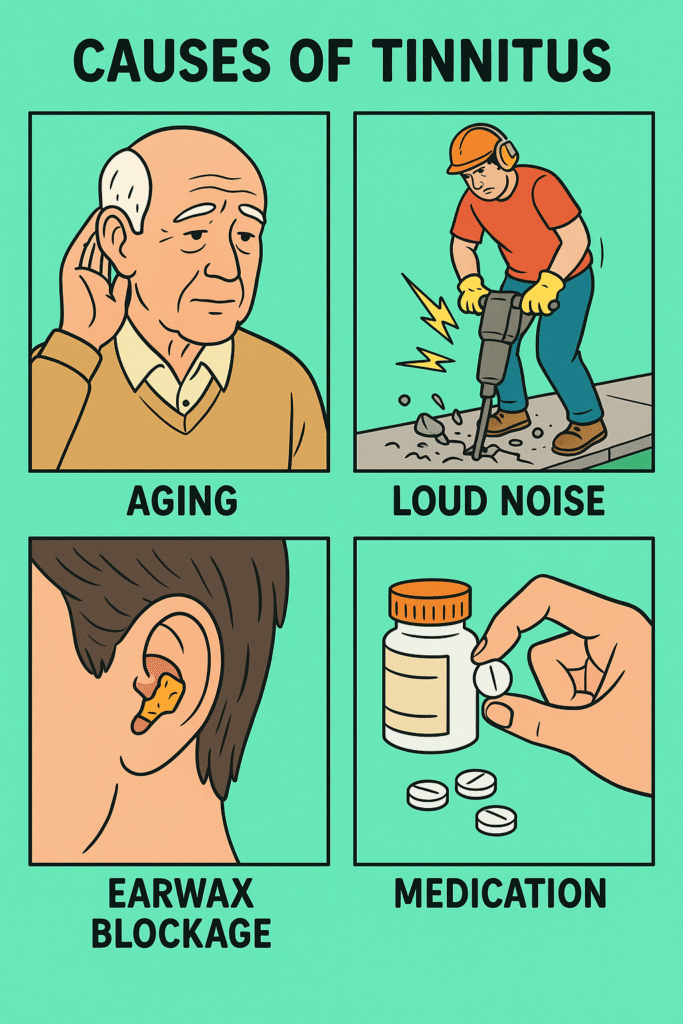What is Ringing in the Ears?
Ringing in the ears, medically known as tinnitus, is the sensation of hearing sound when no external sound is present. It often sounds like a high-pitched ringing, buzzing, hissing, clicking, or even roaring in one or both ears.
You might be surprised to know that about 15-20% of people experience some form of tinnitus during their lives. It’s not a disease itself, but a symptom of an underlying issue—like hearing loss, ear injury, or circulatory problems.
How Does It Happen?
Think of your auditory system like a finely tuned orchestra. Sound waves enter your ear, travel through the ear canal, vibrate the eardrum, and are converted into nerve signals that your brain interprets. But when part of this system—especially the tiny hair cells in your inner ear—is damaged, your brain may “fill in the silence” by generating phantom sounds.
It’s like a missing instrument in an orchestra; instead of silence, the brain improvises, and what you hear is the persistent ringing of tinnitus.
What Causes Tinnitus?
Tinnitus has several potential causes, and sometimes, more than one factor is at play:
- Age-related hearing loss (Presbycusis) – The most common cause. As we get older, hearing sensitivity naturally declines, especially in high-frequency ranges.
- Loud noise exposure – Regular exposure to loud music, machinery, or explosions can damage the tiny hairs in the cochlea, leading to tinnitus.
- Earwax blockage – Excessive earwax can press against the eardrum or block the ear canal, altering how you hear and possibly causing ringing.
- Ear infections or diseases – Conditions like otosclerosis (stiffening of middle ear bones), Meniere’s disease, or middle ear infections can trigger tinnitus.
- Head or neck injuries – Trauma can affect the auditory nerves or brain function related to hearing.
- Medications (Ototoxic drugs) – Aspirin (in high doses), antibiotics like gentamicin, chemotherapy drugs, and some antidepressants may trigger or worsen tinnitus.

Risk Factors
Tinnitus can affect anyone, but certain factors raise the risk:
- Age – Hearing worsens naturally with age, especially after 60.
- Loud noise exposure – Musicians, construction workers, and soldiers face higher risks.
- Gender – Men are slightly more likely to develop tinnitus than women.
- Smoking – Smokers have higher rates of tinnitus, possibly due to circulatory damage.
- Cardiovascular issues – Conditions like high blood pressure or narrowed arteries can affect blood flow to the inner ear.
- Stress and anxiety – These don’t cause tinnitus directly, but they can worsen its perception and impact.
Other Symptoms That May Occur
Most people with tinnitus only hear the noise internally. However, if tinnitus is a sign of a larger condition, you might also experience:
- Hearing loss – Especially if the inner ear is affected.
- Ear fullness or pressure – Often seen with Meniere’s disease or infections.
- Dizziness or vertigo – Inner ear disorders can disturb your balance.
- Clicking or pulsing sounds – Pulsatile tinnitus often matches your heartbeat and may be linked to vascular issues.
If your tinnitus is sudden, worsens rapidly, or is accompanied by hearing loss or dizziness, see a doctor right away.
How is Tinnitus Diagnosed?
There’s no single test to diagnose tinnitus itself, but identifying the underlying cause is key.
The gold standard includes:
- Hearing (audiological) tests – These assess your range and sensitivity of hearing.
- Physical exam – A doctor may inspect your ears, jaw, and neck for signs of tension, wax build-up, or inflammation.
- Imaging tests – MRI or CT scans might be done if the tinnitus is unilateral (one-sided), pulsatile, or associated with neurological signs.
You may also be asked to describe the sound, its pattern, and what makes it better or worse.
Treatment Options for Tinnitus
There’s currently no universal cure for tinnitus, but don’t lose hope—many people find relief through treatment tailored to the underlying cause.
Mainstream Treatment:
- Hearing aids – If hearing loss is involved, amplifying external sound can mask the tinnitus.
- Sound therapy – White noise machines, fans, or calming nature sounds can help distract the brain.
- Cognitive Behavioral Therapy (CBT) – CBT helps change how you perceive and react to the sound, reducing distress and improving quality of life.
- Tinnitus Retraining Therapy (TRT) – Combines sound therapy with counselling to gradually “train” your brain to tune out the noise.
Other Options:
- Earwax removal – If buildup is to blame, professional cleaning may help.
- Medication review – Your doctor may change ototoxic drugs if they’re contributing to the ringing.
- Mindfulness and stress management – Yoga, meditation, and deep breathing can reduce the anxiety that often worsens tinnitus.
Some people also explore acupuncture, supplements (like ginkgo biloba), or dietary changes, though evidence for these is still limited.
Final Thoughts
Tinnitus can be annoying—sometimes even maddening—but it’s not a life sentence. With the right approach, many people find ways to reduce the volume, reclaim their focus, and sleep more peacefully.
If you’re struggling with ringing in your ears, don’t suffer in silence. Seek help, explore your options, and remember: your brain is adaptable, and relief is possible.
References
- Tinnitus: Symptoms and Causes – Mayo Clinic, 2023. https://www.mayoclinic.org/diseases-conditions/tinnitus/symptoms-causes
- Tinnitus – National Institute on Deafness and Other Communication Disorders (NIDCD) – NIH, 2022. https://www.nidcd.nih.gov/health/tinnitus
- Tinnitus: Diagnosis and Management – Harvard Health Publishing, 2023. https://www.health.harvard.edu/newsletter_article/tinnitus-diagnosis-and-treatment
